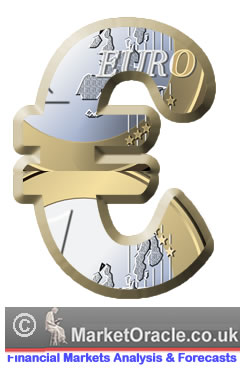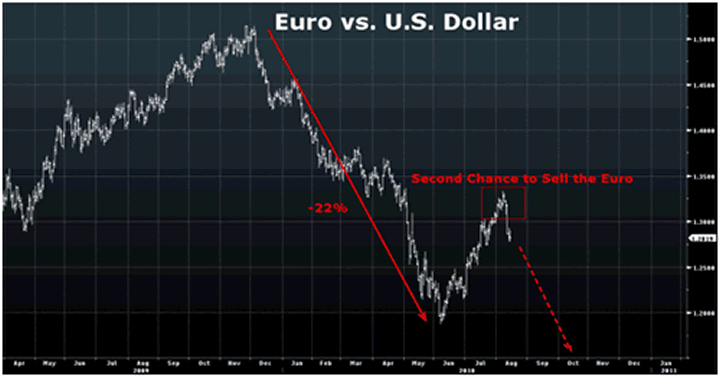Fed’s Wake-Up Call Gives the Euro a Dose of Reality
Currencies / Euro Aug 14, 2010 - 12:32 PM GMTBy: Bryan_Rich
 The Fed surprised many people this week when it announced it would respond to the deteriorating economy with more efforts to stimulate.
The Fed surprised many people this week when it announced it would respond to the deteriorating economy with more efforts to stimulate.
It was a splash of cold water on the face of the world, a wake-up call that hammered home the reality of the economic climate: The recession wasn’t normal, the recovery wasn’t real, and we’re only half way through what will likely be described as a global depression.
The recent deterioration in global economic data, led by the U.S., is clearly showing that the massive government policy responses that gave a mirage of recovery on paper didn’t do a thing for the real economy. The real economy wasn’t able to pull itself up by the boot-straps and pick up where the government stimuli dropped off.
No longer are investors holding onto the dream of a normal recovery, much less a sharp recovery.
I’ve been warning about this reality throughout the crisis, even as Wall Street was assuring investors that a return to normalcy was underway.
The evidence is, and has been, clear: The world is littered with unsustainable debt. And global de-leveraging is still in the early stages.
Moreover, the global trade imbalances that contributed to the crisis, and prohibit the global economy’s return to a sustainable path of growth, still reign.
That’s why I’ve stressed to my subscribers, the importance of the “big-picture” by following …
Three Key Reference Points
As I’ve said many times in my Money and Markets columns, the guide for where we stand and where we’re headed in this global economic environment can be simplified in these historical references …
- The world is still enduring a historical economic crisis, one that has been defined by the worst financial crisis in history and a deep, widespread global recession. The IMF’s study on 122 recessions finds that recessions that are global and synchronized with financial crisis tend to have slower recoveries than average recessions, typically running about five years before long-term trend economic growth resumes.
That means, if you mark the start of the recent crisis as late 2007, we’re less than three years in!
- One of the most thorough studies on historical debt crises suggests that financial crises tend to lead to sovereign debt crises … and they tend to be contagious.
- History also shows that sovereign debt crises tend to lead to currency crises.
So based on history, we most likely have a long road ahead. And we should expect more shocks and crises.
But investors don’t like that reality. Perhaps they’re confused or distracted by all of the government rule-changing, market volatility and Wall Street cheerleaders.
|
And those cheerleaders could have led you to believe some dangerous misconceptions …
Wall Street Misconception #1: QE creates demand.
The reality: QE didn’t work. And it won’t work going forward. This economic crisis is driven by damaged balance sheets. And consumers, businesses and now many governments are in balance sheet repair mode … i.e. cutting back, paying down debt, saving and playing defense.
That means depressed demand is a major problem. And it could remain depressed for a long time, because attitudes toward debt could be generationally changed …
When consumers have been damaged by debt, are out of a job, are underwater on their homes and sitting on big investment losses, they have no interest in spending or borrowing — regardless of how much paper money central banks toss around the world.
Wall Street Misconception #2: The recession was a normal recession, and a sharp recovery would follow.
The reality: The data and the Fed’s latest response have already refuted this one.
Wall Street Misconception #3: Europe’s problems are solved.
The reality: Remember when former Treasury Secretary Hank Paulson stood before Congress and asked for a bailout “Bazooka” … i.e. a shockingly massive show of government support to restore confidence in the banking system? And then, do you remember when the U.S. publicly stress-tested the banks and concluded “all is well, nothing to see here”?
Europe borrowed that playbook in a desperate attempt to avert a disaster of its own — to restore confidence. The difference? Europe’s bluff will be called. And when it is, don’t expect the fiscally responsible countries to cough up their share of the $1 trillion worth of promises. They’ll just let the weak countries go.
Wall Street Misconception #4: The dollar would be taken to the woodshed.
The reality: If you’re a billionaire in Russia, and you see the writing on the wall — a long painful global economic downturn, a contagion of sovereign debt defaults, and a response of global competitive currency devaluations — where would you want your money?
I think the answer is obvious: In the U.S. Treasury market … i.e. in U.S. dollars.
|
Therefore, the theories about doom for the dollar don’t add up! And the dollar wins as the best alternative among paper currencies, especially against …
The Weakening Euro
Perhaps you were one of the many paralyzed by the hype about a supposed imminent death-spiral of the dollar … a believer of the idea that the euro would supplant the dollar as the new primary reserve currency. Or maybe you were dead certain that a V-shaped recovery was underway, opportunities to embrace risk were abound, and that there was no need to worry about more shocks and collapses in financial markets.
Well if you were among that crowd, you witnessed in horror the near collapse of the monetary union in the first half of this year, which brought the euro to its knees and most other currencies with it.
And as you can see in the chart below, you were likely exposed to the euro’s 22 percent free-fall.
|
If you missed the boat to sell on the first slide that took place from late November of 2009 until early June of this year — you had a second chance over the past two months, when the euro sharply rallied from just above $1.18 to more than $1.33.
However, with the Fed’s wake-up call on the state of the world, the euro’s latest retracement is likely done. In fact, on Wednesday, the day after the Fed’s stimulus announcement, the euro dropped 2.4 percent — the biggest one-day fall in almost two years.
Now it’s fair to expect Act II of the crisis for the common currency.
Regards,
Bryan
P.S. I’ve been showing my World Currency Alert subscribers how to use exchange traded funds to profit from rising and falling currencies, like the euro. Click here to discover more.
This investment news is brought to you by Money and Markets. Money and Markets is a free daily investment newsletter from Martin D. Weiss and Weiss Research analysts offering the latest investing news and financial insights for the stock market, including tips and advice on investing in gold, energy and oil. Dr. Weiss is a leader in the fields of investing, interest rates, financial safety and economic forecasting. To view archives or subscribe, visit http://www.moneyandmarkets.com.
© 2005-2022 http://www.MarketOracle.co.uk - The Market Oracle is a FREE Daily Financial Markets Analysis & Forecasting online publication.






